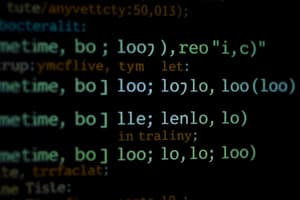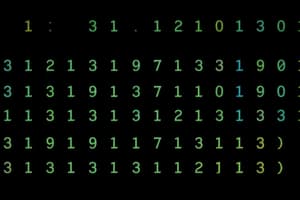Podcast
Questions and Answers
In a do-while loop, when is the condition checked?
In a do-while loop, when is the condition checked?
- After executing the loop code at least once (correct)
- It is never checked
- Before executing the loop code
- Only if the loop code runs 5 times
What happens if the condition in a do-while loop is always true?
What happens if the condition in a do-while loop is always true?
- The loop never runs
- The loop runs infinitely (correct)
- The loop runs only once
- The loop behaves like an `if` statement
How does a do-while loop compare to an if statement in terms of execution?
How does a do-while loop compare to an if statement in terms of execution?
- An `if` statement guarantees that its code runs multiple times
- A `do-while` loop always executes its code at least once, unlike an `if` statement (correct)
- `do-while` loops never run their code
- Both are exactly the same in execution
What does the value of i need to be for the loop to end?
What does the value of i need to be for the loop to end?
Why is it important to understand different loop types in programming?
Why is it important to understand different loop types in programming?
Which loop type requires an initialization, condition, and increment/decrement operation in its structure?
Which loop type requires an initialization, condition, and increment/decrement operation in its structure?
In a while loop, when does the condition get evaluated?
In a while loop, when does the condition get evaluated?
Which loop type is more suitable when the number of iterations is known beforehand?
Which loop type is more suitable when the number of iterations is known beforehand?
What happens if the condition in a while loop is never met?
What happens if the condition in a while loop is never met?
Which loop type executes its condition only after the statement(s) inside the loop is executed?
Which loop type executes its condition only after the statement(s) inside the loop is executed?
Which control structure can be used to execute different blocks of code based on different conditions?
Which control structure can be used to execute different blocks of code based on different conditions?
Flashcards are hidden until you start studying
Study Notes
Programming loops allow developers to automate processes by repeatedly executing a series of instructions. These loops enable the efficient execution of specific sets of commands multiple times and play a crucial role in structuring algorithms and solving problems. They come in different types, including while, for, and do-while loops.
While Loop
The while loop is a sequential control structure that continuously executes a statement while a specified condition is satisfied. Its basic structure consists of a condition followed by the statement(s) to be repeated. Initially, the condition is evaluated; if it is true, the statement(s) inside the loop is executed. Then, the condition is checked again, and the process continues until the condition becomes false.
int i = 0;
while (i < 5) {
printf("Hello, World!\n");
i++;
}
Here, the printf() function is executed five times because the condition (i < 5) is true during each iteration.
For Loop
The for loop is similar to the while loop, with a slight difference in syntax. Instead of evaluating a condition at the beginning of each iteration, it initializes a variable and performs it inside a loop. The format includes three parts: initialization, condition, and increment/decrement operation. This structure ensures precise control over the loop's execution.
for (int i = 0; i < 5; i++) {
printf("Hello, World!\n");
}
In this case, i is initialized to zero and checked against 5. If i is less than 5, the command within the loop runs. Otherwise, the loop ends.
Do-While Loop
The do-while loop differs from the other two types in that it ensures the loop's body runs at least once before checking the condition. Unlike the if statement, where the condition must evaluate to true for the loop to start, the do-while loop guarantees that the code within it executes at least once.
int i = 0;
do {
printf("Hello, World!\n");
i++;
} while (i < 5);
For the do-while loop, the condition (i < 5) is checked after the code inside the loop has already executed at least once.
All loop types serve essential purposes in manipulating data and constructing algorithms. Understanding their differences and knowing how to effectively utilize each type allows programmers to solve a wide range of computational problems efficiently.
Studying That Suits You
Use AI to generate personalized quizzes and flashcards to suit your learning preferences.




